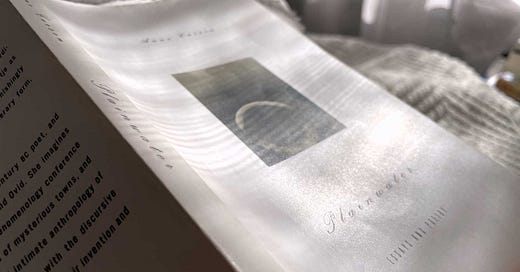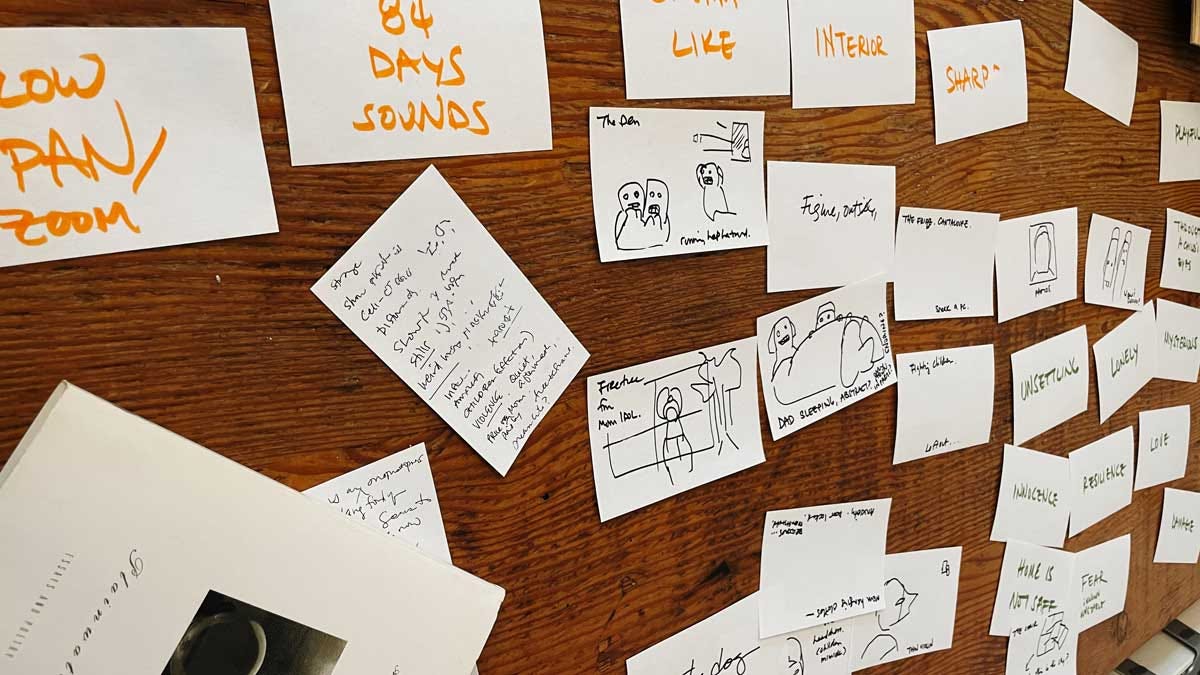Day after day I think of you as soon as I wake / up. Someone has put cries of birds on the air / like jewels.
—Anne Carson, ”On Le Bonheir d'Etre Bien Aimée”
This month, I’ve been nerding out on Anne Carson.
Humor me, because: I’m obsessed; all of this leads back to what I make sooner or later; and because maybe this says something about you, too.
I’ve owned Plainwater for years, but was never able to get into it. Save for the beautiful cover, it remained an unenticing mystery. Every time I gave it a go, the pages stared back at me, placidly incomprehensible and closed.
Some say that Carson’s work can only be accessed at specific times in a reader’s life, like a magic portal that opens when certain things are lived and known. Turns out, now is my time for Plainwater—the pages, these past two weeks, have opened like flowers.
Its passages have for me the same weird and timely I see you quality as the verses of the Bible did when I was a believer:
“There is no question I am someone starving. There is no question I am making this journey to find out what that appetite is.”
Parts of it read like (are?) journal entries. I gather that she is backpacking through the Spanish flat plains with someone she calls My Cid. At one point, there’s a flaring of conflict which seems to persist over multiple days. Here’s how she describes being pissed off:
“From outside it all, looking down: two tiny figures moving on the Meseta. Two animals enraged with each other. How can you tell? Pay particular attention to the nerves. Every one is visible. See, as they burn, you can look right down the heart’s core. See it crumble like old dry bread.”
That last sentence places me with them, traveling for days, heat and dust and time, fatiguing and predictable. Being “pissed off” is damage, history, entanglement.
Here’s an actual argument:
“He begins to answer the question (I don’t remember what it was). And he has a certain way of answering a question (as we all do). And I know what he is going to say (as soon as he begins). And all at once I am enraged. My sharp pilgrim’s knife flashes once. “I know!” right across his open face.
I know. I know what you say. I know who you are. I know what you mean. Why does it enrage an animal to be given what it already knows?”
I mean.
It’s so exciting to read Plainwater now, that it’s hard to remember not being excited by it. I’ve been carrying it with me, apologetically ticking pages with a 4H pencil whenever I sit. Sometimes I just hold, or look, at it.
This kind of delayed connection has also happened with other books—until recently, I didn’t understand what the dog was in Drusilla’s monologue from The Unvanquished. Theresa Hak Kyung Cha’s Dictée didn’t resonate with me until over twenty years after I’d first encountered, and dismissed, it.
Such moments are personal growth markers; that I can engage with art I previously didn’t like, or couldn’t even understand, gives me hope about my future relationships with currently inaccessible things, including my own work. It also makes me appreciate how many people I have been, and how many I remain to be.
In the Studio
In startling contrast to the richness of my consuming life, I’ve been feeling impotent and ungenerative in my studio life.
Getting stuck occasionally is part of the deal, and while I get frustrated like anyone, I’m trying to approach it with as much curiosity and flexibility as I can.
Read on for studio jetsam—sketches, index cards, faces. I think out loud about “conviction,” and potential next steps. Plus, Provisions (what I’ve been taking in for inspiration).
In my current state, this hilarious and insightful article (an oldie) by Sam Anderson about Carson’s struggle with writing “Red Doc >” felt a timely read. (Geniuses are just like us!)
She wrote “Autobiography of Red” in less than a year, happily. “It made sense to me all the way through as a work, as an offering,” she wrote in an e-mail. “Red Doc >,” by contrast, was “a mess, obstacle course, uphill grapple in the dark, almost totally disoriented and discontented experiment every minute of the thousand or so years it took to work out.”
The “thousand or so” translates to about eleven, in human years. While I hope it doesn’t take me years to get moving again, being in my own “almost totally disoriented and discontented experiment” the past few weeks makes the road ahead feel long.
Here’s the “roll call of terrible,” as my friend Mateo would say:
Lines for the lead-in, pulling back from last time to explore a child’s POV:
There are things here to return to, but everything felt forced and I couldn’t gain traction. In the end, I took a time out, and drew faces.
Sometimes that’s all we can do.
None of this feels exactly unfamiliar. Historically, I’d fight anything I perceived as friction or delay. When I finished Chamoe, I went into anxious “play” mode. I was eager to define direction for my next film, which I hurriedly stamped Masks. I storyboarded it. Sequences were outlined, style primers established, vignettes begun.
Obviously, I ended up telling my story through a vastly different lens—Mother Land. The moment it flickered into view I knew that that was the film I wanted to make. Once there, all I had to do was execute. But getting to conviction was a pain.
All that to say: maybe “being stuck” isn’t what I think it is. Maybe it’s a signal to unfocus, not try to jump back into production right away.
These are squirmy moments; but sharing them is a principal reason I set out to write TLB in the first place. To spotlight the mess between beginnings and ends—including all the grapples in the dark, disorientation, discontented experiments, and dormancy.
I’m meeting with a mentor in a few days to soundboard on this.
Provisions
The Hunt · Off-Broadway
Excellent production starring Tobias Menzies (you may know him as Edmure Tully from Game of Thrones). The venue is beautiful, acoustics insane. Until Sunday.
Latches of Being: A User’s Guide to Anne Carson. Article
Introduction to Carson, with cat video.
The Art of the Literary Poster · Exhibit
Magical.
Whitney Biennial · Exhibit
I liked one installation from member previews: Hudson Yards filmed with an iPhone on a gimbal, counterbalanced with a vibrator for surreal distortion.
Naomi Rosenblum ICP Talks · Conversation
Teju Cole was at the International Center of Photography to promote his new book, Pharmakon. Greek for poison/cure, incidentally, a word we’d been discussing it in the class I’m auditing at Columbia. I emailed my professor right away and he got a kick out of it too:
Most of the audience seemed to be in on the joke, and these are the kinds of moments where I feel most at home, and among my people.
Until next time.












This is deeply relatable and reassuring: All that to say: maybe “being stuck” isn’t what I think it is. Maybe it’s a signal to unfocus, not try to jump back into production right away.
Ooo Tenth of December by George Saunders was one of those books for me. Finally revisited it after years on my bookshelf and it stunned me.
Also Teju at ICP, WHAT. Sad I missed